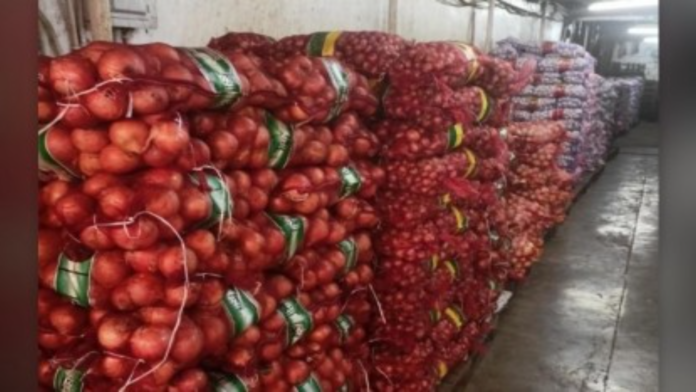President Ferdinand R. Marcos Jr. on Tuesday directed the Department of Justice (DOJ) and the National Bureau of Investigation (NBI) to investigate the alleged hoarding and smuggling of agricultural commodities, including onion.
Marcos issued the latest directive after Marikina Rep. Stella Quimbo, in a memorandum transmitted to him, said there is “substantial” evidence that a cartel is behind the surge in onion prices.
“I have just given instructions to the DOJ and the NBI to initiate an investigation into the hoarding, smuggling, (and) price fixing of agricultural commodities,” he said. “And this is stemming from the hearing that we’ve conducted in the House (of Representatives), specifically by Congresswoman Stella Quimbo, and the findings that they came up with.”
Marcos said the alleged cartel’s acts are tantamount to economic sabotage.
Quimbo, who led the Committee on Agriculture and Food’s investigation on the agricultural hoarding issue, tagged the Philippine Vegetable Importers, Exporters and Vendors Association (VIEVA) Group of Companies, Inc. (PVGCI) as the main player in the onion cartel.
Marcos said the findings of the congressional hearings are “sufficient grounds” to initiate an investigation.
“And that is why we are going to be very, very strict about finding these people and making sure that they are brought to justice,” he said.
The House of Representatives conducted a series of investigations in the wake of the sharp increase in onion prices starting in July 2022, which was attributed to a perceived shortage of supply.
However, data from the Department of Agriculture’s (DA) Bureau of Plant Industry showed only a modest shortage of approximately 7.56 percent in 2022, which could not justify the significant inflation rates reaching 87 percent in December of that year.
Task force
The DOJ said it will collaborate with other government agencies, including the DA and Bureau of Customs.
“Together with these agencies, the Department will create an Anti-Agricultural Smuggling Task Force along with a Special Team of Prosecutors primarily focused on protecting the entire agricultural sector, not only the onion industry,” the DOJ said in a statement.
A team of investigators will collect evidence, conduct interviews, and analyze data to uncover the intricate web of onion smuggling networks, the statement read.
“Once these cases are ready, the DOJ will file charges, ensuring that those responsible will face the full force of the law,” it added.
The DOJ said its investigation encompasses violations of Republic Act No. 10845 or the Anti-Agricultural Smuggling Act and will pursue cases related to profiteering, hoarding, and smuggling, which are recognized as acts of economic sabotage.
Suspects
Quimbo also presented an “Onion Matrix” which involves several firms engaged in the trading and importation of onions and other vegetables acting in connivance with owners of cold storage facilities.
She said responses from cold storage facility owners during the hearings also indicated an ample supply of onions during the period of price surges.
This led to the expośe of the activities of the cartel allegedly engaged in price-fixing through manipulation of stocks, leveraging control over cold storage facilities.
Lilia “Lea” Cruz, the key player of the PVGCI dubbed “Sibuyas (Onion) Queen,” denied her involvement in the importation, saying her participation was limited to trucking and assisting farmers.
Quimbo, however, countered Cruz’s claim and bared the latter’s heavy involvement in the onion industry being the majority stockholder of the PVGCI established in 2012.
The PVGCI, along with other major players in the onion industry, is implicated in cartel operations, including coordination of stock withdrawals and price-fixing at various stages.
One of Quimbo’s recommended actions to address the issue is the dismantling of the cartel with the help of the DOJ, NBI, and Philippine Competition Commission.
Earlier this month, Marcos said the national government is carrying out a “vertical integration” strategy to address the issues in the agriculture sector, such as hoarding and smuggling. (PNA)


